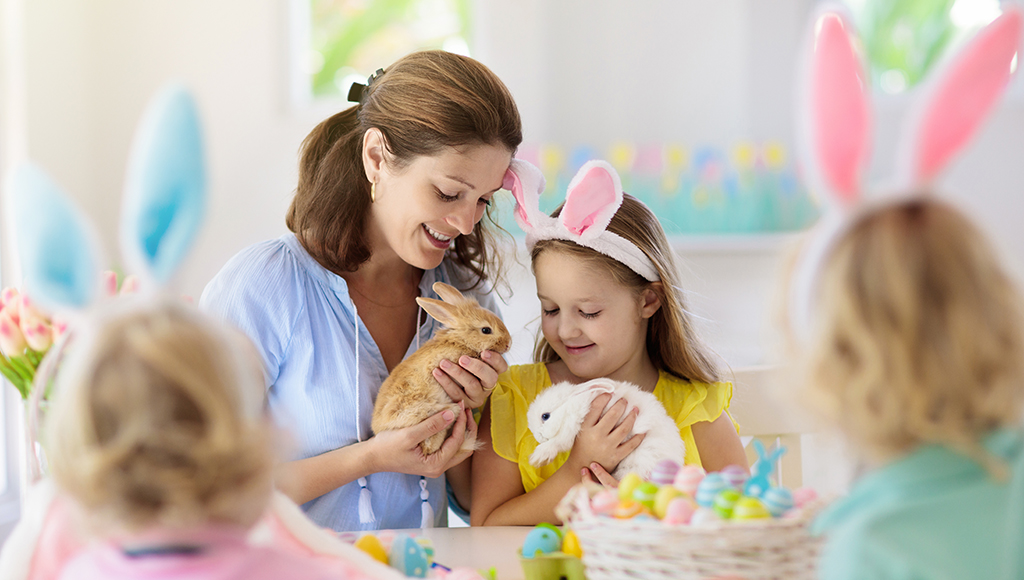Helpful Tips When Giving Pets as Easter Gifts
Before giving a pet as a gift, be sure the recipient is aware of all the expense and responsibility that comes with it.

Small furry animals, including bunnies, chicks, ducklings, puppies and kittens are often given as Easter gifts. Before giving a pet to a loved one or friend this Easter, please make sure the person wants to be the recipient of a bundle of adorable fur that comes with a bundle of expenses and a bundle of responsibilities as well.
There are many reasons to have a pet. Pets can be entertaining; they can be played with and can give lots of love unconditionally. Pets can give new meaning to the life of a lonely or elderly person, and can also help teach children about being responsible. However, pets are also time-consuming, may require training and sometimes need medical care that is often expensive. Pets also need regular visits to the veterinarian, periodic bathing, brushing and grooming, and lots of love and attention, just as much as they need their daily food and water.
This may all sound a bit overwhelming, and for the recipient of one of these furry little darlings, it can be! The responsibility of owning another living creature is immense. Anyone who is considering acquiring a pet for themselves, their children, or for others, needs to seriously consider all the obligations, responsibilities and expenses that are part of that special gift.
Important Facts About Rabbits:
- Did you know, that the cute baby bunny you’re thinking of buying for your child on Easter may still be around long after your child has grown into a teenager? Rabbits can live as long as small dogs, from seven to ten years. Should the novelty wear off, you’ll have an adult rabbit in the house who needs your care and attention every day.
- Young children and bunnies are not a good match. Pet rabbits aren’t low-maintenance pets, and they have specific dietary and veterinary needs, and must be handled with great care.
- Pet rabbits must be live indoors, with their human families. Thousands of ex-Easter bunnies are abandoned to shelters or into the wild each year when their novelty wears off. This is unfortunate and when released into the wild can be instant death for a domesticated rabbit.
If your family is set on getting a rabbit, start by giving a book on rabbit care. If the child is still begging you for a bunny after the holiday has passed, go to your local shelter or rescue group and find out how to adopt one of their rabbit, or even better, a bonded pair. For information on bunny care and rescue groups, visit the House Rabbit Society.
What About Those Cuddly Chicks?
According to the American Humane Association, while some of these animals come into homes where they are well cared for, the majority of baby chicks that are given as Easter gifts suffer and die from lack of proper care and stress within a few weeks of the holiday.
- Most purchasers give little consideration to the special feeding, care and handling needs their new pet requires and after the novelty wears off, do not have the time, facilities or adequate information to continue to care for these animals properly.
- Young children unknowingly and unintentionally squeeze and cuddle baby animals too much and too hard, often resulting in broken bones, internal injuries and death for these delicate creatures.
- Many are killed and injured by other household dogs and cats.
- As these delicate animals grow and children get bored with them, these animals are neglected in backyard pens or dumped outside to return to the wild, where they die from predators, starvation or exposure. Many of them flood into shelters where they must be killed because nobody wants them and there is not sufficient space to keep them.
- If you are considering a chick as an Easter pet, learn all you can first. Chickens are not low-cost or low-maintenance, as many stores and pet shops will tell you. They are as big a responsibility as a larger pet and require as much care and interaction as a dog or cat.
- Chickens need a brooder, a place where they can run around but also be protected from the family dog or cat. You can use a large cardboard box, which can be covered to keep predators out. If you are concerned about other pets you can place the brooder inside a wire cage. In just a few short weeks, however, those cute little chicks won't be so little anymore, and they will need bigger accommodations, preferably a chicken coop, and room to run around.
- Don't forget that these cute, fuzzy animals will grow up to be significantly larger adults. Chickens can also live up to 16 years. You must be able to commit to care for at least that long.
- Children may be at risk for acquiring Salmonella infection from these pets after they receive them as gifts. Frequent hand-washing and good hygiene are imperative for both the health of your family and the chicken.
If you want to teach your children about the responsibility of caring for animals, take them to the local humane society. There they can learn about the care necessary for animals and they can make a donation toward that care.
Ready to start saving money on pet wellness care?
Then take a look at Mint Wellness, the pet wellness plan that provides fast reimbursement on routine pet care. Save on vaccinations, wellness exams, preventatives, dental, and more!
Learn More


